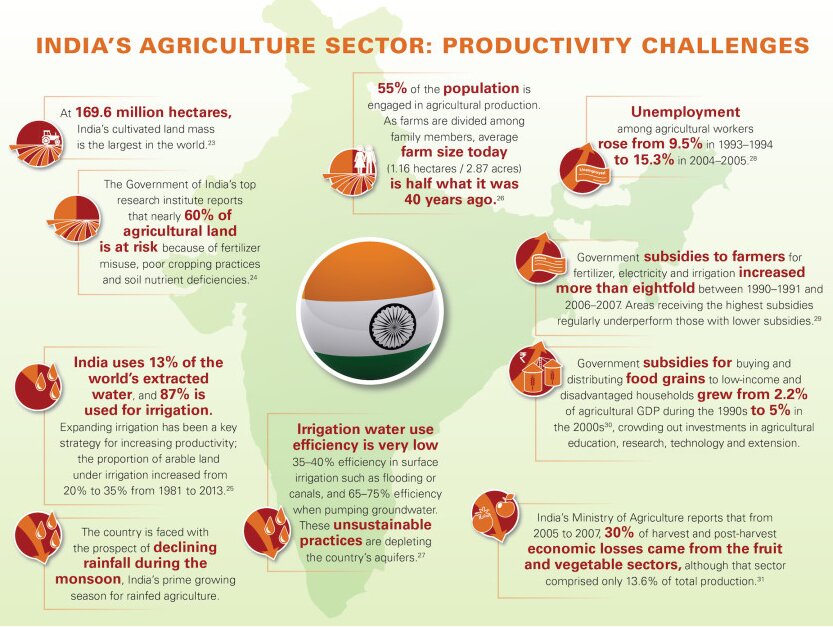Agriculture
Farmer’s Protest
- 21 Sep 2020
- 7 min read
This article is based on “It’s a no green signal from the farm world” which was published in The Hindu on 21/09/2020. It talks about the farmer’s protest regarding three bills that pertain to agricultural marketing reforms in the parliament.
Recently, there have been strong protests from farmers, especially from the states of Punjab and Haryana, against three farm bills that seek to replace ordinances issued in june 2020.
These bills envisage to bring change in some of the key aspects of the farm economy — trade in agricultural commodities, price assurance, farm services including contracts, and stock limits for essential commodities.
These bills sought to bring much needed reforms in the agricultural marketing system such as removing restrictions of private stock holding of agricultural produce or creating trading areas free of middlemen and take the market to the farmer.
However, farmers are apprehensive that the free market philosophy supported by these bills could undermine the Minimum Support Price (MSP) system and make farmers vulnerable to market forces.
Note :
Three Farm Bills that are bond of contention:
- The Farmers' Produce Trade and Commerce (Promotion and Facilitation) Bill, 2020,
- The Farmers (Empowerment and Protection) Agreement of Price Assurance and Farm Services Bill, 2020,
- Essential Commodities (Amendment) Bill, 2020.
Intended Benefits Associated with These Bills
- The Bills aim to do away with government interference in agricultural trade by creating trading areas free of middlemen and government taxes outside the structure of Agricultural Produce Market Committees (APMCs).
- It will allow farmers an option to sell their produce directly to these new zones, without going through the middlemen and paying levies such as mandi fees.
- It sought to remove stock holding limits as well as curbs on inter-State and intra-State trade, and create a framework for contract farming.
- Also, these bills promote the creation of Farmer Producer Organisations (FPO) on a large scale and will help in creating a farmer-friendly environment for contract farming where small players can benefit.
- These bills may enable private players to invest in warehousing, grading and other marketing infrastructure.
- A combined effect of these bills will help in creating a ‘One Nation, One Market’ for agricultural produce.
Issues Raised by The Farmers & Opposition
- Federal Angle: The provisions in the Farmers’ Produce Trade and Commerce (Promotion and Facilitation) Bill, 2020, provides for unfettered commerce in designated trade areas outside APMC jurisdictions.
- Apart from this, the bill empowers the Centre government to issue orders to States in furtherance of the law’s objectives.
- However, matters of trade and agriculture being the part of subjects on the State list, have caused resentment in States.
- Lack of Consultation: First the ordinance route and now the hastily attempt to pass the Bills without proper consultation adds to the mistrust among various stakeholders including farmers.
- Also, by allowing ‘trade zones’ to come up outside the APMC area, farmers have become apprehensive that the new system would lead to eventual exit from the minimum support price.
- Absence of any regulation in non-APMC mandis: Another issue that is raised by the farmers is that the proposed bills give the preference for corporate interests at the cost of farmers’ interests.
- In absence of any regulation in non-APMC mandis, the farmers may find it difficult to deal with Corporates, as they solely operate on the motive of profit seeking.
- Non-Favourable Market Conditions: While retail prices have remained high, data from the Wholesale Price Index (WPI) suggest a deceleration in farm gate prices for most agricultural produce.
- With rising input costs, farmers do not see the free market based framework providing them remunerative prices.
- These fears gain strength with the experience of States such as Bihar which abolished APMCs in 2006. After the abolition of mandis, farmers in Bihar on average received lower prices compared to the MSP for most crops.
Way Forward
- Improve Agricultural Infrastructure to Strengthen Competition: Government should massively fund the expansion of the APMC market system, make efforts to remove trade cartels, and provide farmers good roads, logistics of scale and real time information.
- Empowering State Farmers Commissions: Rather than opting for heavy centralisation, the emphasis should be on empowering farmers through State Farmers Commissions recommended by the National Commission for Farmers, to bring about a speedy government response to issues.
- Consensus Building: The Centre should reach out to those opposing the Bills, including farmers, explain to them the need for reform, and get them on board.
Conclusion
Without strong institutional arrangements, the free market may harm lakhs of unorganised small farmers, who have been remarkably productive and shored up the economy even during a pandemic.
|
Drishti Mains Question “There is a need for strong institutional arrangements before unleashing the laissez-faire policy in Indian agriculture”. Discuss. |







